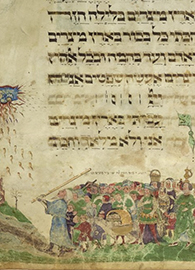Selections From Israel's Story Week 1
Introduction: From Egypt to the Promised Land
Torah
We are now returning to Israel’s story at the place we left off: the Israelites have just been freed from slavery in Egypt, and have traveled through the wilderness to Mount Sinai, where they are prepared to receive God’s law.
The word translated “law” is the Hebrew word torah. But torah refers to much more than just the lists of what is commanded and what is forbidden. The word is connected with the Hebrew verb yrh, which means “to teach,” so torah quite literally means “teaching,” or “instruction.” It includes laws and commandments, to be sure, but the Torah is much broader than that.
As Dr. Frank Spina writes in his introduction to the Genesis/Exodus Lectio, Torah is ultimately a story, a liturgy, and a way of life. It is the life God intends for the people of God. And after the people of God have been redeemed from their bondage in Egypt, they need instructions from God about how they are to live.
Redemption Before Instruction
Indeed, the order is significant. First, the Israelites are redeemed; then they are given instructions, or law. In other words, it was not that God came to the Israelites and said, “Here’s a list of the things you have to do and the way you need to live before I free you and make you my people. Once you show me that you can do these things and live this way, then I’ll deliver you from Egypt.”
No! God’s gracious act of redemption always comes first, without preconditions or requirements. Obviously, that’s what makes it grace — it is not something earned. It is after God has saved the Israelites and set them free that God makes known how they should live. Of course, this is the same pattern we see in the New Testament. Jesus Christ died on the cross to save all people from their sins. Paul’s letters emphasize with crystal clarity that it is grace by which we are saved (Ephesians 2:8–9).
Once we have been saved by grace, how should we then live? The collection of New Testament letters known as the Catholic Epistles, or Pillars (compare Galatians 2:9), give instruction for living a life of faith — doing “works.” As James put it in his description of Abraham, “You see that his faith was active along with his works, and faith was brought to completion by the works” (James 2:22).
The Freedom God Gives
It is also important to understand the type of freedom God gave the Israelites. Often when we think of “freedom,” it has the sense of autonomy, or self determination. But that was not the liberation experienced by the Israelites. The slogan of the Exodus is summarized in the call to Pharaoh, “Let my people go!” But the fuller command reads “Let my people go, that they may serve me” (Exodus 7:16; 8:20; 9:1, 13; 10:3). [Author’s Note 1]
To be sure, the Israelites were freed from their degrading subjugation to Pharaoh, but that meant they were freed to serve the loving, redeeming God of Israel. No longer were they in bondage to the cruel, proud king of Egypt, but they were dedicated — even consecrated — to service to God. [Author’s Note 2]
Such an understanding of freedom may seem foreign to us, and even challenges the conception we have about the relationship between God and God’s people. A biblical understanding of being the people of God involves service to God. Indeed, it may even suggest that we are God’s slaves — but we are in bondage to a master who cares for and ennobles those who serve him.

 EnlargeIsraelite Amnesia, and God’s Faithfulness
EnlargeIsraelite Amnesia, and God’s Faithfulness
It would have been nice if the story had ended with Exodus 15:21 — or even if we were able to skip from the celebration after crossing the Red Sea to the giving of the Ten Commandments on Mount Sinai — because almost immediately after the Israelites worship God for being a God like no other (Exodus 15:11), they complain (15:24). Their complaint is not without warrant; there is no water, and they are three days into the desert.
But, as Dr. Spina writes, it’s as if they suffer from a spiritual amnesia. They just witnessed God’s power over the Egyptians. They experienced God’s provision for themselves: they crossed the sea on dry land. But they quickly turn from songs of praise to words of complaint. In the sections we will look at from Israel’s story, those complaints will only continue.
The other thing that will continue is God’s provision and problem solving. Just as God solved the problem of bitter water (Exodus 15:22–25), just as God provided bread from heaven (Exodus 16:2–36), God will respond to all of Israel’s needs while they are in the wilderness. But amidst all the stories of provision run stories about Israel’s complaints and doubts.
Recurring Themes
The selections we have chosen for this summer’s set of readings is selective, because we are not able to cover every chapter of Israel’s story in Exodus through Deuteronomy! But they are also intentional: we focused on the major events that move Israel out of Egypt into the Promised Land. In addition to the themes of God’s provision and Israel’s complaints/doubts, we will also see recurring themes about God’s nature, as well as the nature of God’s people.
The main character in all these texts is God, who is powerful, fearful, angry and gracious, forgiving, and loving. The second main character in these texts is Moses, who gives us a powerful model for how we can relate to and with God. The people are, in the Bible’s own words, “stiff-necked,” which means they are stubborn. They are forgetful again and again. They are quick to turn away from God. But while these stories will show that Israel is deeply flawed, they will affirm that they are God’s chosen people not because of any merit they have, or because of their great size, but because God loves them (Deuteronomy 7:7-8).
In the Wilderness
Though our stories this quarter cover four books in the Old Testament, they all take place in the same geographical location: the wilderness. As is true with the rest of the Bible, geography has a spiritual significance. The wilderness is a barren place, where not much grows. The wilderness is a dry place, without much water. The wilderness is a hot place, without much shelter or shade. The wilderness is a place of exposure, where a person cannot hide.
But it is also a vast place, where a person can get lost. Perhaps it seems counterintuitive for God to lead the people into the wilderness after bringing them out of Egypt, for it exposes the fragility of their faith.
Yet just as a plant in a desert must send its roots deep in order to find water, a desert place requires that roots of faith go deep. Following God in the wilderness requires a deepening and maturing of faith and trust. Faith and trust are nice things to talk about, but much harder to actually practice.
It is easy to say you have faith that God will grant all your needs when you are sitting in a comfortable chair, perhaps with a good cup of coffee, reading this on your computer screen. It is much harder to say when you are in a desert, with no food or water anywhere in sight.
During their time in the wilderness, the people of Israel will be tested, tried, deepened, formed, and matured. Tragically, the hopes for growth are not always realized; instead of deepening roots, some will wither away. Interestingly, the wilderness is referred to in Hosea as a honeymoon period — there, the prophet suggests that Israel’s problems of doubt and apostasy did not start until they entered the Promised Land (Hosea 2:14–23).
For those who know the stories, it seems like an odd analogy, for honeymoons are supposed to be times of bliss. The stories we will read about in Exodus through Deuteronomy are often challenging, tragic, and frustrating as we see the Israelites make mistake after mistake.
Perhaps the analogy is best understood in the context of Hosea’s marriage metaphor, that God and Israel are in an intimate relationship with each other. In the midst of Israel’s unfaithfulness — in the wilderness and beyond — God is always faithful.
Questions for Further Reflection
- This new Lectio series will continue to help us explore Israel’s story as told in the Torah. What does the Lectio writer say about the meaning of Torah? What is the significance (both for Israel and for us today) of God giving the people the law after redeeming them from slavery?
- The Lectio writer spends significant time considering the theme of freedom. When you think about the word “freedom,” what comes to mind? In terms of your faith, what difference does it make if we think of “freedom for” instead of “freedom from”?
- Have you experienced “desert places” in your faith? If so, reflect on the conditions—i.e. what it was like, and on the outcomes—i.e. what happened? After reading just a little bit about Israel’s experiences in the desert, what value might there be in such experiences in your own life?
Back to Selections from Israel’s Story Next Lectio>>

This work is licensed under a Creative Commons License.




